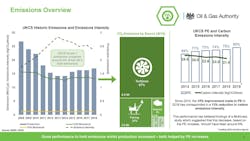Higher UK carbon emissions from imported LNG, report finds
Offshore staff
LONDON – Production of gas from fields on the UK continental shelf (UKCS) generates less than half the greenhouse gas produced from imported LNG, according to Britain’s Oil and Gas Authority (OGA).
Its analysis shows that gas extracted from the UKCS has an average emission intensity of 22 kg CO2e/boe, compared with an average of 59 kg CO2e/boe for imported LNG. This is due to a combination of the process of liquefaction and emissions produced by the transportation and regasification of the LNG once it arrives in the UK.
Importing gas through pipelines, particularly from Norway, produces an even lower average of 18 kg CO2e/boe, the OGA added, suggesting that the UKCS has scope to improve its operations and lower emissions further.
Last year UK fields supplied 46% of UK gas consumption, with imported LNG providing around 21% and pipeline imports 33%.
Gas demand looks set to fall from 69 bcm in 2019 to 60 bcm in 2035, with UK gas production declining at a faster rate, from 35 bcm in 2019 to 16 bcm in 2035.
But current government forecasts suggest gas will remain an important part of the UK’s energy mix during the transition to Net Zero greenhouse gas emissions by 20250. So, managing declining North Sea production to maximize value will remain essential.
At the same time, the OGA believes the UK gas production industry should progress measures to reduce its footprint or risk losing its social license to operate.
Hedvig Ljungerud, OGA director of Strategy, said: “The oil and gas industry is currently having to deal with the effects of the global pandemic and the rapid fall in commodity prices, and we’re working with the government and the industry to safeguard supply and thousands of jobs.
“This data highlights both the need to continue producing our own gas as long as we consume it, to minimize emissions, and support the drive to Net Zero, while pushing ahead with emissions reductions from UK production.”
05/27/2020
